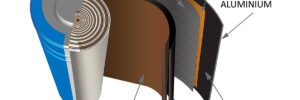
ProLogium Technology aims to start pilot production of its fourth-generation lithium ceramic battery (LCB) containing a fully inorganic electrolyte by the end of 2025.
Increasing the inorganic content from 90% to 100% enhances energy density, charging speed, low-temperature reliability and safety, according to the company.
The fourth-generation LCB achieves specific energy of 380 Wh/kg and energy density of 860-900 Wh/L, compared with the third-generation’s performance of 359Wh/kg and 811Wh/L—improving range, reducing costs and enabling lighter, more efficient designs. The system supports thick-film and bi-cell technologies.
ProLogium’s ceramic separator and advanced wet film coating technology deliver three times the thermal conductivity of traditional liquid batteries, the company said. Large-format cell designs (200-500 × 560 mm) enhance heat dissipation for stability under high-load conditions like high-speed driving. The planar liquid cooling system reduces reliance on active cooling, lowers activation frequency and improves overall energy efficiency.
The battery delivers consistent range performance at -20° C.
Unlike conventional lithium-ion or sulfide-based batteries, ProLogium’s fully inorganic electrolyte is non-flammable under extreme heat or voltage. An advanced Active Safety Mechanism (ASM) further prevents thermal runaway by activating automatically at high temperatures.
In overcharge tests—including 300° C, 5 C, 20 V and 250% capacity—the battery remained fireproof and non-combustible, achieving a Hazard Level of 2-3.
“We’re nearing our 2026 target of surpassing 450 Wh/kg and 1,000 Wh/L with lithium metal anodes,” said Prologium’s founder and Chairman Vincent Yang, referencing the company’s latest lab results.
Source: ProLogium
from Charged EVs https://ift.tt/4er2PSc
No comments:
Post a Comment